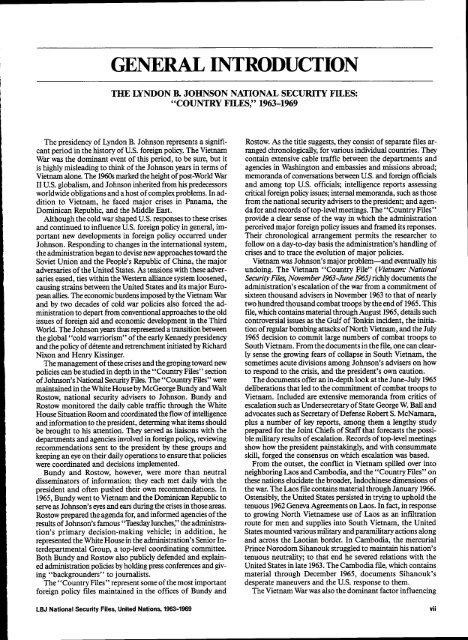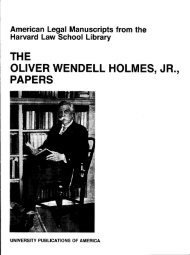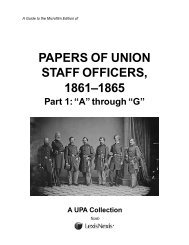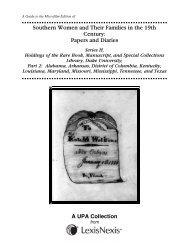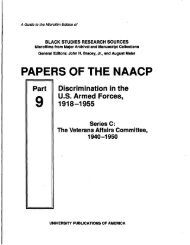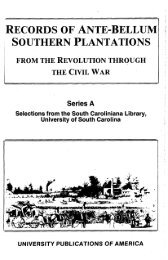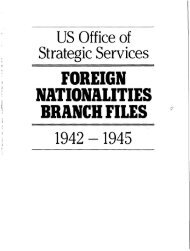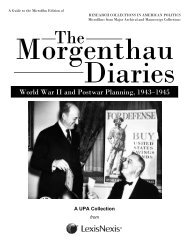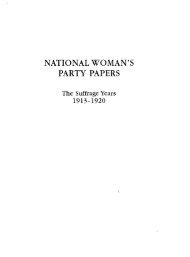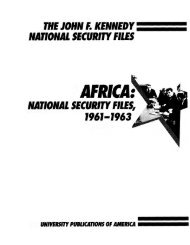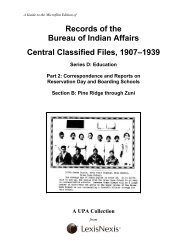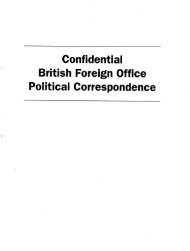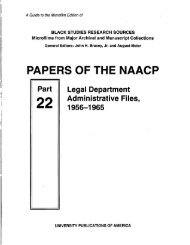THE UNITED NATIONS: - ProQuest
THE UNITED NATIONS: - ProQuest
THE UNITED NATIONS: - ProQuest
You also want an ePaper? Increase the reach of your titles
YUMPU automatically turns print PDFs into web optimized ePapers that Google loves.
GENERAL INTRODUCTION<br />
<strong>THE</strong> LYNDON B. JOHNSON NATIONAL SECURITY FILES:<br />
"COUNTRY FILES," 1963-1969<br />
The presidency of Lyndon B. Johnson represents a signifi-<br />
cant period in the history of U.S. foreign policy. The Vietnam<br />
War was the dominant event of this period, to be sure, but it<br />
is highly misleading to think of the Johnson years in terms of<br />
Vietnam alone. The 1960s marked the height of post-World War<br />
II U.S. globalism, and Johnson inherited from his predecessors<br />
worldwide obligations and a host of complex problems. In ad-<br />
dition to Vietnam, he faced major crises in Panama, the<br />
Dominican Republic, and the Middle East.<br />
Although the cold war shaped U.S. responses to these crises<br />
and continued to influence U.S. foreign policy in general, im-<br />
portant new developments in foreign pohcy occurred under<br />
Johnson. Responding to changes in the international system,<br />
the administration began to devise new approaches toward the<br />
Soviet Union and the People's Republic of China, the major<br />
adversaries of the United States. As tensions with these adver-<br />
saries eased, ties within the Western alliance system loosened,<br />
causing strains between the United States and its major Euro-<br />
pean allies. The economic burdens imposed by the Vietnam War<br />
and by two decades of cold war policies also forced the ad-<br />
ministration to depart from conventional approaches to the old<br />
issues of foreign aid and economic development in the Third<br />
World. The Johnson years thus represented a transition between<br />
the global ' 'cold warriorism' ' of the early Kennedy presidency<br />
and the policy of détente and retrenchment initiated by Richard<br />
Nixon and Henry Kissinger.<br />
The management of these crises and the groping toward new<br />
policies can be studied in depth in the "Country Files" section<br />
of Johnson's National Security Files. The "Country Files" were<br />
maintained in the White House by McGeorge Bundy and Walt<br />
Rostow, national security advisers to Johnson. Bundy and<br />
Rostow monitored the daily cable traffic through the White<br />
House Situation Room and coordinated the flow of intelligence<br />
and information to the president, determing what items should<br />
be brought to his attention. They served as liaisons with the<br />
departments and agencies involved in foreign policy, reviewing<br />
recommendations sent to the president by these groups and<br />
keeping an eye on their daily operations to ensure that policies<br />
were coordinated and decisions implemented.<br />
Bundy and Rostow, however, were more than neutral<br />
disseminators of information; they each met daily with the<br />
president and often pushed their own recommendations. In<br />
1965, Bundy went to Vietnam and the Dominican Republic to<br />
serve as Johnson's eyes and ears during the crises in those areas.<br />
Rostow prepared the agenda for, and informed agencies of the<br />
results of Johnson's famous ' 'Tuesday lunches,' ' the administra-<br />
tion's primary decision-making vehicle; in addition, he<br />
represented the White House in the administration's Senior In-<br />
terdepartmental Group, a top-level coordinating committee.<br />
Both Bundy and Rostow also publicly defended and explain-<br />
ed administration policies by holding press conferences and giv-<br />
ing "backgrounders" to joumahsts.<br />
The "Country Files" represent some of the most important<br />
foreign policy files maintained in the offices of Bundy and<br />
Rostow. As the title suggests, they consist of separate files ar-<br />
ranged chronologically, for various individual countries. They<br />
contain extensive cable traffic between the departments and<br />
agencies in Washington and embassies and missions abroad;<br />
memoranda of conversations between U.S. and foreign officials<br />
and among top U.S. officials; intelligence reports assessing<br />
critical foreign policy issues; internal memoranda, such as those<br />
from the national security advisers to the president; and agen-<br />
da for and records of top-level meetings. The "Country Files"<br />
provide a clear sense of the way in which the administration<br />
perceived major foreign policy issues and framed its réponses.<br />
Their chronological arrangement permits the researcher to<br />
follow on a day-to-day basis the administration's handUng of<br />
crises and to trace the evolution of major policies.<br />
Vietnam was Johnson's major problem•and eventually his<br />
undoing. The Vietnam "Country File" (Vietnam: National<br />
Security Files, November 1963-Jme 1965) richly documents the<br />
administration's escalation of the war from a commitment of<br />
sixteen thousand advisers in November 1963 to that of nearly<br />
two hundred thousand combat troops by the end of 1965. This<br />
file, which contains material through August 1965, details such<br />
controversial issues as the Gulf of Tonkin incident, the initia-<br />
tion of regular bombing attacks of North Vietnam, and the July<br />
1965 decision to commit large numbers of combat troops to<br />
South Vietnam. From the documents in the file, one can clear-<br />
ly sense the growing fears of collapse in South Vietnam, the<br />
sometimes acute divisions among Johnson's advisers on how<br />
to respond to the crisis, and the president's own caution.<br />
The documents offer an in-depth look at the June-July 1965<br />
deliberations that led to the commitment of combat troops to<br />
Vietnam. Included are extensive memoranda from critics of<br />
escalation such as Undersecretary of State George W. Ball and<br />
advocates such as Secretary of Defense Robert S. McNamara,<br />
plus a number of key reports, among them a lengthy study<br />
prepared for the Joint Chiefs of Staff that forecasts the possi-<br />
ble military results of escalation. Records of top-level meetings<br />
show how the president painstakingly, and with consummate<br />
skill, forged the consensus on which escalation was based.<br />
From the outset, the conflict in Vietnam spilled over into<br />
neighboring Laos and Cambodia, and the "Country Files" on<br />
these nations elucidate the broader, Indochinese dimensions of<br />
the war. The Laos file contains material through January 1966.<br />
Ostensibly, the United States persisted in trying to uphold the<br />
tenuous 1962 Geneva Agreements on Laos. In fact, in response<br />
to growing North Vietnamese use of Laos as an infiltration<br />
route for men and supplies into South Vietnam, the United<br />
States mounted various military and paramilitary actions along<br />
and across the Laotian border. In Cambodia, the mercurial<br />
Prince Norodom Sihanouk struggled to maintain his nation's<br />
tenuous neutrality; to that end he severed relations with the<br />
United States in late 1963. The Cambodia file, which contains<br />
material through December 1965, documents Sihanouk's<br />
desperate maneuvers and the U.S. response to them.<br />
The Vietnam War was also the dominant factor influencing<br />
LBJ National Security Files, United Nations, 1963-1969 VII


